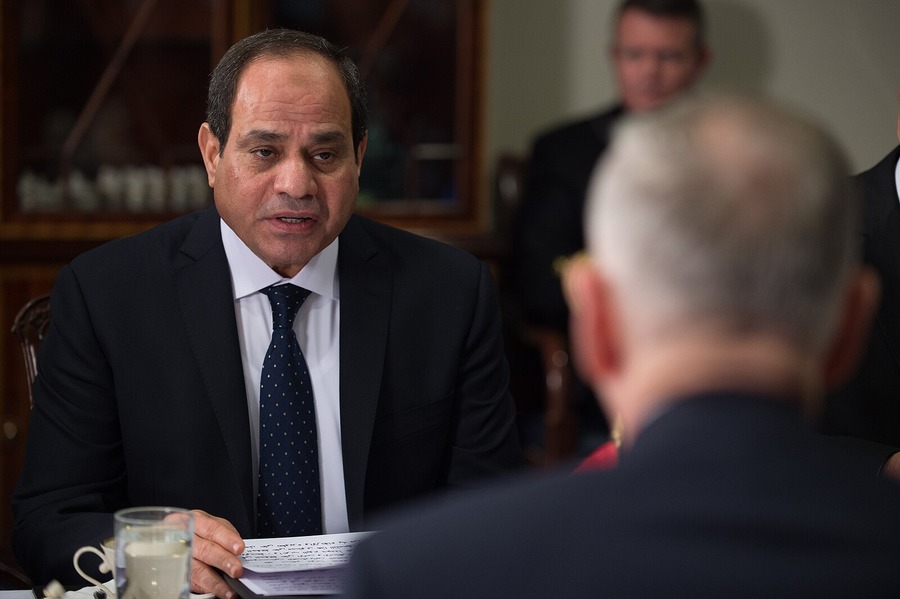Egypt’s Dystopian Criminal Procedure Code

Published by The Lawfare Institute
in Cooperation With

For the past few months, Egyptian authorities have been promising anyone who will listen that they plan to resolve the country’s pretrial detention crisis. They’ve convened sessions as part of the national dialogue; they’ve made commitments in meetings with American and European partners; and even President Abdel Fattah El-Sisi has weighed in on the matter.
So it came as a surprise when, last month, a parliamentary subcommittee instead began discussing a dystopian draft criminal procedure code that, if passed, will destroy the country’s entire criminal justice system—normalizing warrantless searches, eating away at the role of lawyers in their clients’ defense, and criminalizing trial monitoring, among other alarming provisions.
On the international stage, it came as even more of a surprise that less than one month after this law was proposed, the U.S. State Department, in an unprecedented move for the Biden administration, decided to release the full $320 million conditioned on human rights indicators out of a larger package of $1.3 billion in military aid to Egypt. Out of the $320 million, $225 million is subject to a national security waiver that can be used to bypass these human rights conditions, and $95 million requires Secretary of State Antony Blinken to certify that Egypt has made “clear and consistent progress” in the release of political prisoners and the provision of due process to detainees. In justifying its unprecedented decision to the Wall Street Journal, a State Department official cited the fact that Egypt is “advancing draft legislation to reform pretrial detention and the broader penal code for adoption by parliament”—referencing the very text this article unpacks, widely condemned by the Egyptian Lawyers’ Syndicate, Press Syndicate, and civil society organizations. The administration’s decision has already been challenged by allies of the Biden administration, including Sens. Chris Coons (D-Del.) and Chris Murphy (D-Conn.), who question its reading of facts on the ground in Egypt.
So What's in the Law?
The draft law does technically address pretrial detention. It brings the maximum on pretrial detention for misdemeanors down from 6 months to 4 months; for felonies, from 18 months to 12 months; for felonies for which there is a possible life or death sentence, from 24 months to 18 months; and in cases being heard on appeal where individuals have been sentenced to life or death, to 24 months. It even introduces the concept of compensation for those who’ve been improperly ordered into pretrial detention.
Let’s put aside the fact that 18 months is still an egregiously lengthy period of time to be held in an Egyptian jail without being charged and that a compensation scheme is only as good as the political will of authorities to recognize that they’ve made a mistake in the first place (something Egyptian authorities are not particularly known for). Let’s also put aside the fact that Egypt’s pretrial detention crisis is a result of two phenomena that the draft law is entirely silent on: the improper role that prosecutors enjoy in renewing pretrial detention and the practice of rotation (in which defendants are added into multiple, identical cases to keep them in indefinite pretrial detention).
Beyond these concerns, in a Trojan horse-esque manner the draft law also showcases a handful of articles that promise superficial improvements to pretrial detention, while burying tens of articles across 94 pages that, if collectively approved, will destroy foundational due process protections and usher in one of the most dystopian criminal justice frameworks in Egypt’s modern history.
More specifically, the draft law gives extensive discretion to security forces, allowing them to conduct home searches without a warrant and removing the requirement from the current law that these searches happen in the presence of the defendant, the defendant’s representatives, or the defendant’s neighbors as witnesses. It renders the role of lawyers irrelevant, granting prosecutors the right to decide when and if a lawyer can orally interject during an interrogation or renewal session and whether to allow a lawyer to take a look at the case files or, God forbid, photocopy them to help a lawyer prepare for their client’s defense during the investigation period.
It allows that interrogations, pretrial detention renewal sessions, and pretrial detention appeal sessions be held remotely—taking advantage of an exceptional measure introduced during the coronavirus pandemic to punish defendants, depriving them of the right to step away from the repressive prison walls, the freedom to submit complaints against their jailers, and the rare chance to see their loved ones. It also stipulates that a prosecutor, investigative judge, judge, or court reporter are the ones to be signing case files, while stating that the signatures of defendants, witnesses, experts, and translators are no longer necessary, paving the way for falsified case documents.
The draft law introduces severe restrictions on the ability of lawyers, civil society organizations, and journalists to report on trials. It prohibits the broadcasting of trial sessions unless the written permission of the judge is provided and the prosecution is consulted. It forbids the publication of information and news, and the holding of discussions related to the details of the trial in a manner that would “influence the trajectory of justice.” And in terrorism cases, which are regularly brought against nonviolent dissidents, it bans the publication of any details or information related to the judges, prosecutors, witnesses, or defendants—information that is critical for transparency and accountability.
The draft law also expands the power of the prosecution, granting it the right to directly issue travel bans, a practice Egyptian authorities notoriously rely on to punish peaceful dissidents, instead of going to a court for issuance; it also expands the judicial powers of national security officers, allowing them to conduct interrogations and make arrests.
And these are only some of the key provisions of the draft law.
Bringing the Law to Life
Imagine an Egyptian executive working for a multinational company that is making investments and bringing foreign direct investment into Egypt. In an interview with a news outlet, he makes a passing comment on the economic challenges facing the private sector; he mentions the privileges that companies directly and indirectly affiliated with the state and security apparatus have over those firmly within the private sector. This ruffles some feathers. Security forces then raid his home without a warrant—the new law says they don’t need one in “instances of danger,” leaving the interpretation of that phrase up to the discretion of the officials handling the raid. Having been taken into custody, the executive will be forcibly disappeared for a few days and possibly even tortured. When he’s interrogated the first time, it’ll very likely be in the absence of his lawyer. His family won’t know where he is.
The defendant will then be taken into custody in one of Egypt’s prisons. When he’s questioned for a second time, his lawyer will finally be there. And yet, if his lawyer wants to object to the line of questioning or request that evidence be introduced, his lawyer will have to ask permission. Under the new law, it’ll be up to the prosecutor to decide whether or not the lawyer can speak. When the lawyer asks to take a look at the case files so that the lawyer can prepare the client’s defense, the prosecutor can say no, deeming it outside the interests of the investigation.
Did I mention that this second interrogation is happening remotely? The prosecutor is sitting in his air-conditioned office speaking to a screen. We have no visibility as to who is in the room with him—perhaps one of the national security officers now designated with judicial powers under the new law? The executive is sitting in an interrogation room inside the prison; his lawyer is by his side, and a prison warden is watching their every move. It is certainly no environment in which the executive can submit a complaint implicating the very prison warden who’s been refusing to admit him to the prison hospital despite his history of heart failure. The internet is not always stable, and when the prosecutor levies charges against the defendant, key words seem to get lost depending on the strength of the internet connection.
When the interrogation finally does come to an end, the defendant won’t be required to sign his statement. At best, any confession could be improperly recorded, embellished, or even falsified. Who knows? This is all happening across town anyway, and it’s not like the lawyer can see the case files.
So, What's Next?
If the scenario above sounded far-fetched, it unfortunately is not. Egyptian authorities have been committing violations, like restricting lawyers’ access to their clients and case files and conducting searches without presenting a warrant, outside the scope of the law and in politically motivated cases for years. This draft law only threatens to normalize these violations and extend them to the nonpolitical realm.
But it’s not too late for Egypt to withdraw this draft.
According to domestic reporting, the constitutional and legislative affairs committee of the Egyptian House of Representatives began discussing the draft in early August. Another version of the text is expected to be finalized before it is officially introduced in the full session of parliament for debate, amendment, and approval when the House resumes its work at the beginning of October.
Rather than steamrolling a criminal procedure code for approval that was drafted while parliament was out of session, written without a consultation process, and produced informally and outside even the state’s own and official national dialogue process, Egyptian authorities would do well to scrap this draft and focus on a meaningful resolution of the pretrial detention crisis through law and practice. Perhaps they can consider one or some of the many alternative legal texts offered by the country’s smartest legal minds at or around the national dialogue. While they’re at it, they should also stop ordering new defendants into pretrial detention and release the ones in their custody.
Only then should they consider comprehensive amendments to the criminal procedure code, which does need a serious rewrite. That rewrite, however, should come about as a result of a transparent and comprehensive amendment process that spans months, not weeks; consults preeminent legal experts, lawyers, and impacted persons; and is made better through dynamic debate.
Proceeding with the current draft threatens to destroy a criminal justice system that is not only essential for Egypt’s respect of human rights but also deeply critical for security, stability, and economic progress in the country. If not because the Egyptian people deserve so much better, then because no multinational company will want to invest in a country with a court system where lawyers and defendants are deemed irrelevant and where the verdict, if it ever comes, is a foregone conclusion.




-(1)-(1).png?sfvrsn=1bc11cd_4)
